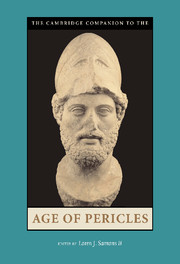Refine search
Actions for selected content:
23990 results in Ancient history
1 - Introducing euergetism: questions, definitions and data
-
- Book:
- The Politics of Munificence in the Roman Empire
- Published online:
- 15 July 2009
- Print publication:
- 27 April 2009, pp 3-22
-
- Chapter
- Export citation
Contents
-
- Book:
- The Politics of Munificence in the Roman Empire
- Published online:
- 15 July 2009
- Print publication:
- 27 April 2009, pp vii-viii
-
- Chapter
- Export citation
10 - The Virtue Politics of Democratic Athens
-
-
- Book:
- The Cambridge Companion to Ancient Greek Political Thought
- Published online:
- 28 September 2009
- Print publication:
- 27 April 2009, pp 271-300
-
- Chapter
- Export citation
Appendix 3 - Public buildings, distributions, and games and festivals per century (N = 399)
-
- Book:
- The Politics of Munificence in the Roman Empire
- Published online:
- 15 July 2009
- Print publication:
- 27 April 2009, pp 170-170
-
- Chapter
- Export citation

The Cambridge Companion to the Age of Pericles
-
- Published online:
- 28 March 2009
- Print publication:
- 15 January 2007
Index
-
- Book:
- The Language of Empire
- Published online:
- 01 October 2009
- Print publication:
- 18 December 2008, pp 218-220
-
- Chapter
- Export citation
4 - The Augustan empire: imperium Romanum
-
- Book:
- The Language of Empire
- Published online:
- 01 October 2009
- Print publication:
- 18 December 2008, pp 117-145
-
- Chapter
- Export citation
2 - The beginnings: Hannibal to Sulla
-
- Book:
- The Language of Empire
- Published online:
- 01 October 2009
- Print publication:
- 18 December 2008, pp 10-62
-
- Chapter
- Export citation
List of abbreviations
-
- Book:
- The Language of Empire
- Published online:
- 01 October 2009
- Print publication:
- 18 December 2008, pp ix-x
-
- Chapter
- Export citation
Contents
-
- Book:
- The Language of Empire
- Published online:
- 01 October 2009
- Print publication:
- 18 December 2008, pp v-vi
-
- Chapter
- Export citation
Appendix 1 - Cicero analysis
-
- Book:
- The Language of Empire
- Published online:
- 01 October 2009
- Print publication:
- 18 December 2008, pp 195-203
-
- Chapter
- Export citation
Preface
-
- Book:
- The Language of Empire
- Published online:
- 01 October 2009
- Print publication:
- 18 December 2008, pp vii-viii
-
- Chapter
- Export citation
5 - After Augustus
-
- Book:
- The Language of Empire
- Published online:
- 01 October 2009
- Print publication:
- 18 December 2008, pp 146-181
-
- Chapter
- Export citation
Appendix 2 - Livy
-
- Book:
- The Language of Empire
- Published online:
- 01 October 2009
- Print publication:
- 18 December 2008, pp 204-205
-
- Chapter
- Export citation
Appendix 3 - Imperium and provincia in legal writers
-
- Book:
- The Language of Empire
- Published online:
- 01 October 2009
- Print publication:
- 18 December 2008, pp 206-210
-
- Chapter
- Export citation
3 - Cicero's empire: imperium populi Romani
-
- Book:
- The Language of Empire
- Published online:
- 01 October 2009
- Print publication:
- 18 December 2008, pp 63-116
-
- Chapter
- Export citation
1 - Ideas of empire
-
- Book:
- The Language of Empire
- Published online:
- 01 October 2009
- Print publication:
- 18 December 2008, pp 1-9
-
- Chapter
- Export citation
6 - Conclusion: imperial presuppositions and patterns of empire
-
- Book:
- The Language of Empire
- Published online:
- 01 October 2009
- Print publication:
- 18 December 2008, pp 182-194
-
- Chapter
- Export citation
Frontmatter
-
- Book:
- The Language of Empire
- Published online:
- 01 October 2009
- Print publication:
- 18 December 2008, pp i-iv
-
- Chapter
- Export citation
Bibliography
-
- Book:
- The Language of Empire
- Published online:
- 01 October 2009
- Print publication:
- 18 December 2008, pp 211-217
-
- Chapter
- Export citation
